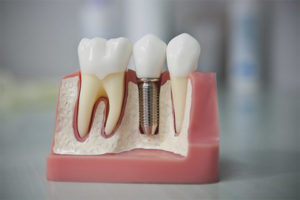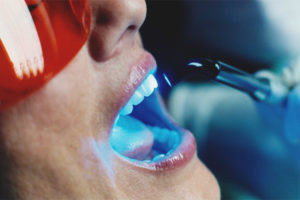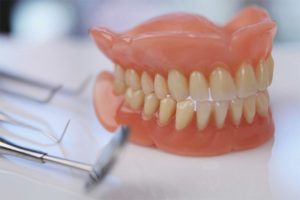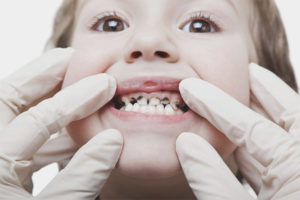The content of the article
Modern dentistry makes huge strides towards improving the quality of our lives. Today, even if you have lost all your teeth to a single, you can easily replace them with removable dentures. Dentures have a lot of advantages - they restore the chewing function, improve diction and aesthetic appearance. But the main difficulty lies not in the cost of prostheses and even not in their manufacture, but in the process of adaptation. Even the most comfortable and high-quality prosthesis needs getting used to. After all, for the body is a foreign body. To make the process short and less uncomfortable, you need to know a few rules. In this article you will learn what difficulties you will have to face during the process of getting used to a removable denture, how to solve these problems, as well as a lot of interesting information regarding dentures.
Dentures
Removable dentures can be either full or partial. Full dentures are used for complete loss of teeth - they can be common, that is, a specific model of the prosthesis is selected relative to your shape and size of the gums. But partial dentures are made on an individual impression, since in this case, complete coincidence is extremely necessary.
Prostheses are made of acrylic, nylon, plastics and other materials. In each case, the doctor selects the material based on the individual characteristics of the patient. Teeth in removable dentures are made of hard material to provide chewing function. But the plate, on which artificial teeth are fixed, is soft, which allows it to better attach to the gums. After putting on, the patient should close the gum together with the prosthesis, so that a vacuum between the structure and the gum is formed, which will keep the prosthesis in its place. Therefore, problems with holding the prosthesis in place, as a rule, does not arise.
In order for the prosthesis to become “native”, you need to go through several stages of a long prosthetic process. First, the patient is examined,then a decision is made on further tactics of action. The oral cavity is prepared for prosthetics - if necessary, caries is treated, fillings are placed, etc. Then an impression of the upper and lower jaws is made, after which a wax sample of the prosthesis is made on its basis. It is completely customized in all respects, its convenience, comfort and aesthetic component are evaluated, and only then on the basis of this wax cast do they make a real full-fledged prosthesis that will serve you for a long time. But after its manufacture follows a difficult process of adaptation, which will allow you to get used to removable dentures and not to notice them again. We will list you some of the main difficulties that prosthetic carriers face, and also suggest some ways to overcome them.
How to suppress discomfort and dry mouth
Sometimes, instead of actively producing saliva, a person, on the contrary, feels dry in the mouth. In this case, you need to drink more water - often, but in small portions. Another way to solve dry mouth problems is to chew gum. Stop drinking coffee, strong black tea and smoking cigarettes. These habits dehydrate and make you dry even more. Some dentists are advised to take 10-15 drops of echinacea tincture to get rid of dryness for a while. You may need to change the rinse - some alcohol-based products dry the mucous.
It is very important to get rid of dryness in time. If this is not done, dentures begin to rub the gums. If the discomfort persists, you need to consult a doctor, there are some dental diseases, the first symptom of which is permanent dryness in the mouth.
How to normally eat with a prosthesis
In the process of eating a person with a prosthesis can have several problems. The very first is the fear of chewing food. Many try to go to the soup, mashed potatoes and broths, making this a big mistake. The process of adaptation is the development of chewing skills in the prosthesis. To overcome the barrier, you need to start eating solid foods, but gradually. Cut slices of apples, carrots or cucumbers into a plate, take one slice and begin to chew thoroughly - slowly, slowly without going anywhere. This will teach you to chew carefully, so as not to damage the gums.
Another problem associated with eating is reducing the taste of many dishes. Since the prosthesis covers most of the palate, on which there are quite a lot of taste buds, a person stops feeling the taste and temperature of products so intensely. However, they quickly get used to this, because the lion's dose of receptors still remains in the language.
How to reduce the gag reflex
This is another common problem that almost all denture carriers face, especially with the complete loss of teeth.The fact is that the coverage area of the upper sky is quite large. In this case, the prosthesis touches the active points in the back of the jaw, which react with a gag reflex. Suppress this feeling will help time. One day after wearing the prosthesis, the nausea will recede and it will feel like less and less to vomit, and in 5-7 days there will be no sign of the symptom. To hold out this time, you need to rinse your mouth with warm salted water, suck on mints. Also try to breathe through your nose so as not to provoke a gag reflex.
How to restore normal speech
Diction disorders are another common problem for dental prosthesis carriers, since teeth are involved in the pronunciation of many sounds. Some patients make the mistake of simply silencing and not participating in conversations. This is an adaptation process and it will go faster if you keep training and getting used to it. It is possible to improve diction with the help of simple exercises. Imagine that you are a small child who needs to learn to speak letters, syllables and words. Take the alphabet and try to speak each letter slowly and quietly.Do it measuredly, learn to speak in a new way. Then try to pronounce syllables, words. To improve the results, you can sit down and try to read books aloud. In this case, you must follow not only the correct pronunciation of sounds, but also to ensure that saliva does not fly apart in all directions. This happens from the habit, which terribly frustrates the owners of prostheses during a conversation with others. You can cope with these problems, you need to train every day at home. The tongue twisters help very well. They can be pronounced very slowly, as long as it is correct. Over time, you will learn to speak not only correctly, but also fluently.
How to get used to removable dentures
Here are some more tips to help you reduce the period of adaptation to dentures.
- In order for the gums to get used to removable dentures better and faster, you need to do a massage. It improves blood circulation, promotes healing of small wounds, makes the gums firm and healthy. Every day, morning and evening, massage the gums with your index finger and thumb, brush with a soft brush.
- Very often, in the initial stages of wearing a prosthesis, friction can be felt, wounds and abrasions appear. This is absolutely normal at the addiction stage.To wounds heal faster, the mouth must be rinsed with antiseptic compounds, decoction of chamomile and calendula.
- Some people use special gels and pastes to fix dentures. They are sold in pharmacies, are not visible to others and are completely safe. They are applied to the inside of the prosthesis after donning. In the evening before removal, it is imperative to remove the remnants of the fixation agent from the prosthesis and gums.
- To the prosthesis does not cause discomfort, the first time it should be worn in front of a mirror.
- Experienced dentists advise not to remove the prosthesis at night for the first time. At night, the tongue and gums do not move, and the mucous of the mouth is still at the stage of addiction. So the adaptation process will be much faster. Until the body gets used, remove the prosthesis only for cleaning.
- Slow down the process of getting used to dentures can be the wrong care. If a piece of food remains between the gumline and the prosthesis, this leads to a microtrauma. To avoid this, you need to rinse your mouth after each meal, clean the denture every evening, using a special brush and paste. Periodically, dentures should be left in antiseptic formulations.
- Sometimes the patient may have an allergic reaction to some materials of the prosthesis. This is manifested by itching and irritation directly in those places where the design is in contact with the mucous membrane. But sometimes an allergy is manifested by general malaise, dizziness, nausea. Symptoms appear immediately after donning. In this case, waiting for addiction is useless - you need to make a prosthesis from another material.
- In addition to the purely technical side of the issue, there is a psychological aspect. If the patient is morally unprepared for wearing a prosthesis, doubts their need and comfort, removes them at every opportunity - the adaptation stretches indefinitely. If a person is sure that the prosthesis will obey him anyway, then he will. Sooner or later, he finally ceases to feel it in his mouth.
Many wonder about how much time is needed to get used to the prosthesis. The question is very specific and depends on many individual features. In any case, there is no need to set time limits and barriers - the body needs to get used to as much time as necessary. Do not rush things.It can only be noted that with the most successful scenario, addiction occurs in 2-3 weeks, on average it takes a month and a half.
If you can’t get used to the prosthesis, it may be wrong. It is necessary to consult with your dentist. However, you first need to be patient and bring the prosthesis three hours before the reception, so that the doctor can assess the nature of the problem. Remember, a properly made and installed denture will wear comfortably, you will not notice it. You just need to get used to it.
Video: denture care













To send